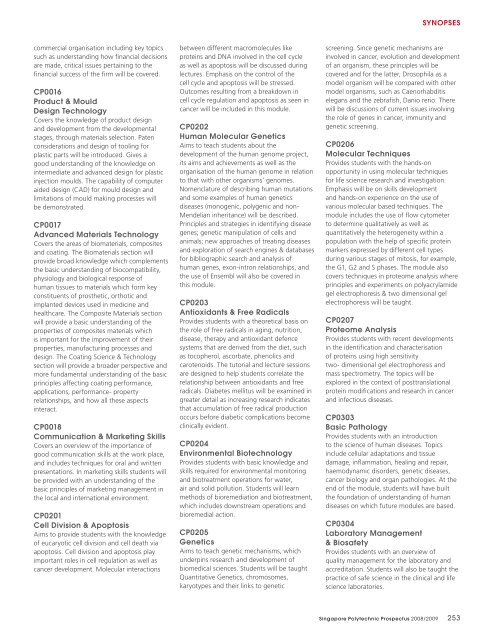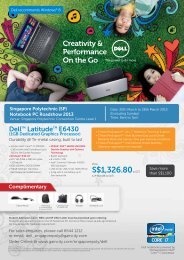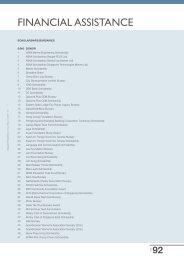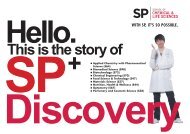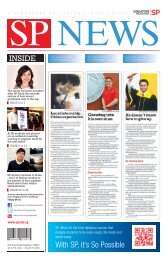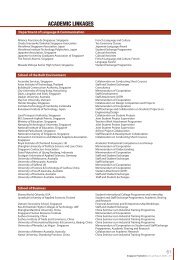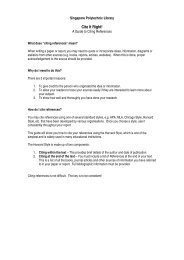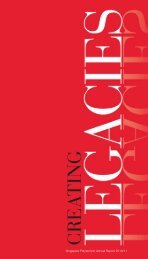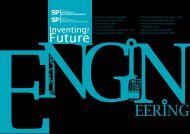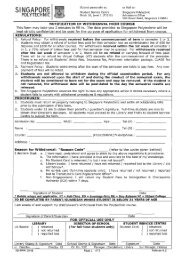SYNOPSES - Singapore Polytechnic
SYNOPSES - Singapore Polytechnic
SYNOPSES - Singapore Polytechnic
You also want an ePaper? Increase the reach of your titles
YUMPU automatically turns print PDFs into web optimized ePapers that Google loves.
<strong>SYNOPSES</strong>commercial organisation including key topicssuch as understanding how financial decisionsare made, critical issues pertaining to thefinancial success of the firm will be covered.CP0016Product & MouldDesign TechnologyCovers the knowledge of product designand development from the developmentalstages, through materials selection. Patenconsiderations and design of tooling forplastic parts will be introduced. Gives agood understanding of the knowledge onintermediate and advanced design for plasticinjection moulds. The capability of computeraided design (CAD) for mould design andlimitations of mould making processes willbe demonstrated.CP0017Advanced Materials TechnologyCovers the areas of biomaterials, compositesand coating. The Biomaterials section willprovide broad knowledge which complementsthe basic understanding of biocompatibility,physiology and biological response ofhuman tissues to materials which form keyconstituents of prosthetic, orthotic andimplanted devices used in medicine andhealthcare. The Composite Materials sectionwill provide a basic understanding of theproperties of composites materials whichis important for the improvement of theirproperties, manufacturing processes anddesign. The Coating Science & Technologysection will provide a broader perspective andmore fundamental understanding of the basicprinciples affecting coating performance,applications, performance- propertyrelationships, and how all these aspectsinteract.CP0018Communication & Marketing SkillsCovers an overview of the importance ofgood communication skills at the work place,and includes techniques for oral and writtenpresentations. In marketing skills students willbe provided with an understanding of thebasic principles of marketing management inthe local and international environment.CP0201Cell Division & ApoptosisAims to provide students with the knowledgeof eucaryotic cell division and cell death viaapoptosis. Cell division and apoptosis playimportant roles in cell regulation as well ascancer development. Molecular interactionsbetween different macromolecules likeproteins and DNA involved in the cell cycleas well as apoptosis will be discussed duringlectures. Emphasis on the control of thecell cycle and apoptosis will be stressed.Outcomes resulting from a breakdown incell cycle regulation and apoptosis as seen incancer will be included in this module.CP0202Human Molecular GeneticsAims to teach students about thedevelopment of the human genome project,its aims and achievements as well as theorganisation of the human genome in relationto that with other organisms’ genomes.Nomenclature of describing human mutationsand some examples of human geneticsdiseases (monogenic, polygenic and non-Mendelian inheritance) will be described.Principles and strategies in identifying diseasegenes; genetic manipulation of cells andanimals; new approaches of treating diseasesand exploration of search engines & databasesfor bibliographic search and analysis ofhuman genes, exon-intron relationships, andthe use of Ensembl will also be covered inthis module.CP0203Antioxidants & Free RadicalsProvides students with a theoretical basis onthe role of free radicals in aging, nutrition,disease, therapy and antioxidant defencesystems that are derived from the diet, suchas tocopherol, ascorbate, phenolics andcarotenoids. The tutorial and lecture sessionsare designed to help students correlate therelationship between antioxidants and freeradicals. Diabetes mellitus will be examined ingreater detail as increasing research indicatesthat accumulation of free radical productionoccurs before diabetic complications becomeclinically evident.CP0204Environmental BiotechnologyProvides students with basic knowledge andskills required for environmental monitoringand biotreatment operations for water,air and solid pollution. Students will learnmethods of bioremediation and biotreatment,which includes downstream operations andbioremedial action.CP0205GeneticsAims to teach genetic mechanisms, whichunderpins research and development ofbiomedical sciences. Students will be taughtQuantitative Genetics, chromosomes,karyotypes and their links to geneticscreening. Since genetic mechanisms areinvolved in cancer, evolution and developmentof an organism, these principles will becovered and for the latter, Drosophila as amodel organism will be compared with othermodel organisms, such as Caenorhabditiselegans and the zebrafish, Danio rerio. Therewill be discussions of current issues involvingthe role of genes in cancer, immunity andgenetic screening.CP0206Molecular TechniquesProvides students with the hands-onopportunity in using molecular techniquesfor life science research and investigation.Emphasis will be on skills developmentand hands-on experience on the use ofvarious molecular based techniques. Themodule includes the use of flow cytometerto determine qualitatively as well asquantitatively the heterogeneity within apopulation with the help of specific proteinmarkers expressed by different cell typesduring various stages of mitosis, for example,the G1, G2 and S phases. The module alsocovers techniques in proteome analysis whereprinciples and experiments on polyacrylamidegel electrophoresis & two dimensional gelelectrophoresis will be taught.CP0207Proteome AnalysisProvides students with recent developmentsin the identification and characterisationof proteins using high sensitivitytwo- dimensional gel electrophoresis andmass spectrometry. The topics will beexplored in the context of posttranslationalprotein modifications and research in cancerand infectious diseases.CP0303Basic PathologyProvides students with an introductionto the science of human diseases. Topicsinclude cellular adaptations and tissuedamage, inflammation, healing and repair,haemodynamic disorders, genetic diseases,cancer biology and organ pathologies. At theend of the module, students will have builtthe foundation of understanding of humandiseases on which future modules are based.CP0304Laboratory Management& BiosafetyProvides students with an overview ofquality management for the laboratory andaccreditation. Students will also be taught thepractice of safe science in the clinical and lifescience laboratories.<strong>Singapore</strong> <strong>Polytechnic</strong> Prospectus 2008/2009 253


